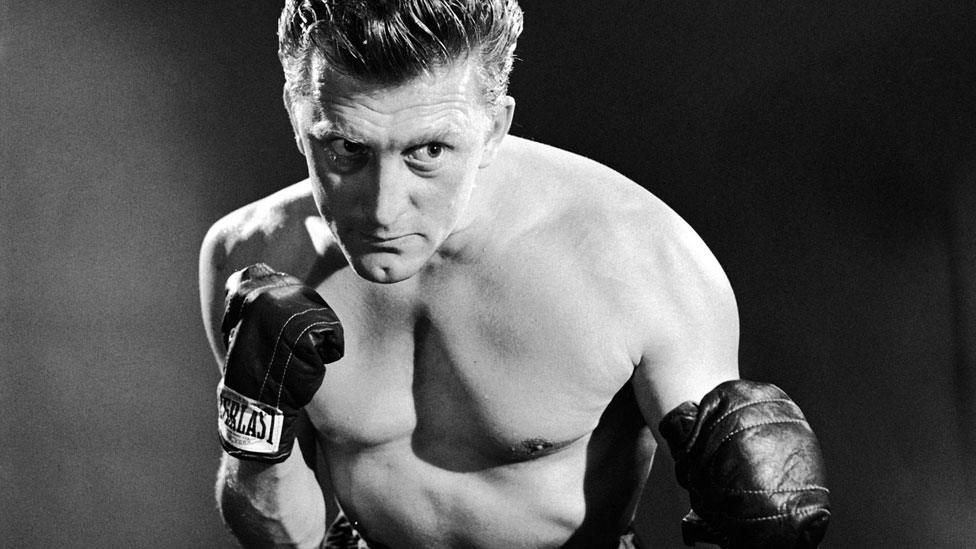Obituary: Kirk Douglas
- Published
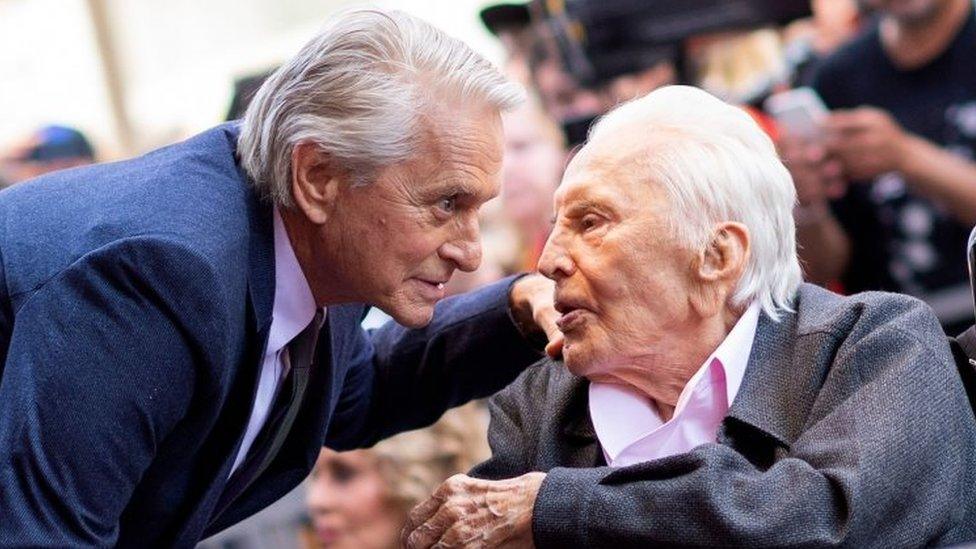
Kirk Douglas (right) and his son actor Michael Douglas. Photo: November 2018
His only Oscar was an honorary award but Kirk Douglas became a Hollywood icon, with a film career spanning seven decades.
He prided himself on playing the tough guys, the sort of characters he once described as "sons of bitches".
He threw himself into his many roles with relish, acting with an intensity that often spilled over into his private life.
And he had a fine contempt for the Hollywood studio establishment, something that may well have made his career less successful than it was.
Kirk Douglas was born Issur Danielovich Demsky to penniless Jewish immigrants in the city of Amsterdam, New York state, in 1916. His father had fled Russia to escape conscription into the Tsar's army.
One of seven children, he sold snacks to local mill workers to earn enough money to buy food and in his autobiography claims to have had more than 40 jobs.
It was when he began acting in school plays that he decided a theatrical career was for him. "The one thing in my life that I always knew, that was always constant, was that I wanted to be an actor."
Already an inter-collegiate wrestling champion, he paid his way through drama college by fighting professionally, ushering and working as a car park attendant and bellhop.
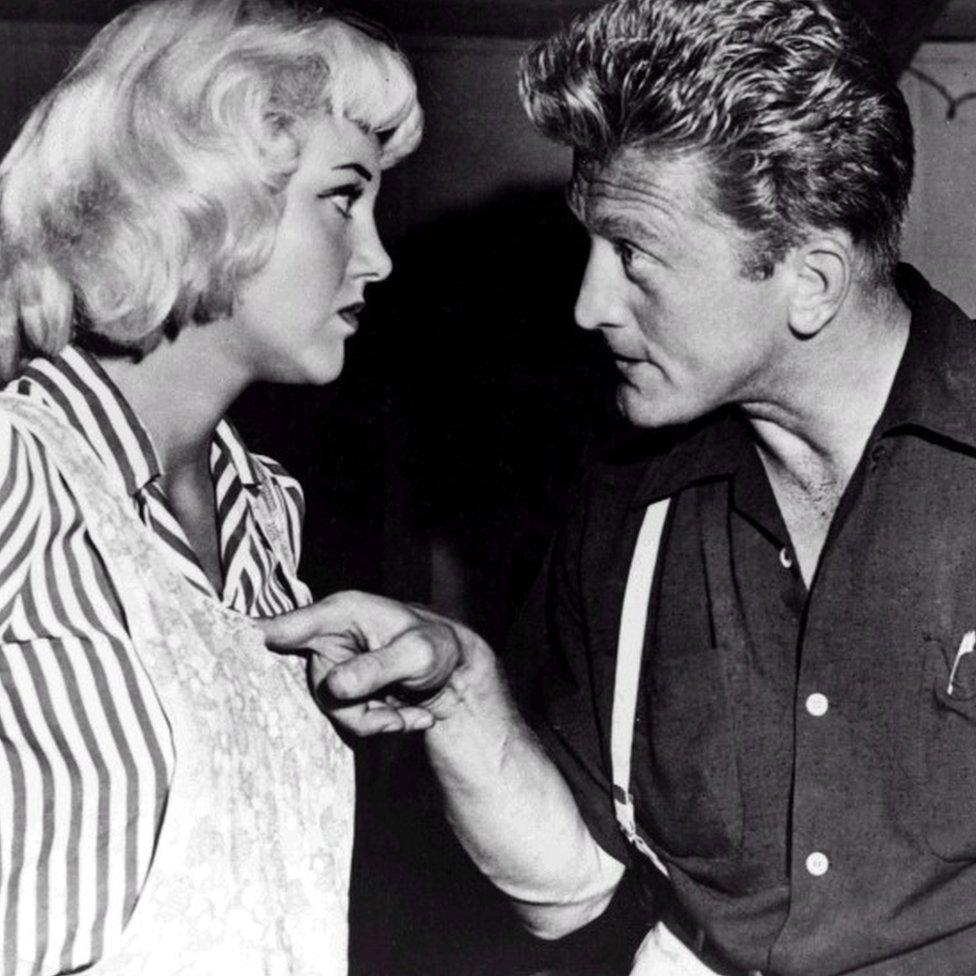
Ace in the Hole saw him play an immoral journalist
He attended the American Academy of Dramatic Arts where among his classmates were Betty Joan Perske, later to be known as Lauren Bacall, and the Bermudian actress Diana Dill.
He began using the name Kirk Douglas while acting during the college break and made his first Broadway appearance under his new name in a small part in a musical.
In 1941 he enlisted in the US Navy but was invalided out two years later because of injury and, in November 1943, he married his former classmate Diana Dill.
The marriage lasted eight years and produced two children, Michael, who would follow in his father's footsteps as an actor, and Joel, who became a film producer.
Douglas had initially planned to become a stage actor but Lauren Bacall recommended him to producer Hal B Wallis who was casting The Strange Love of Martha Ivers.
Douglas successfully tested for the lead role, playing opposite Barbara Stanwyck, already an established star.
He first made his name as a washed-up boxer, Midge Kelly, in Champion in 1949, which earned him the first of three Oscar nominations.
Although he never won the coveted award, Douglas was honoured in the 1996 Academy Awards for 50 years as a creative and moral force in the movie industry.
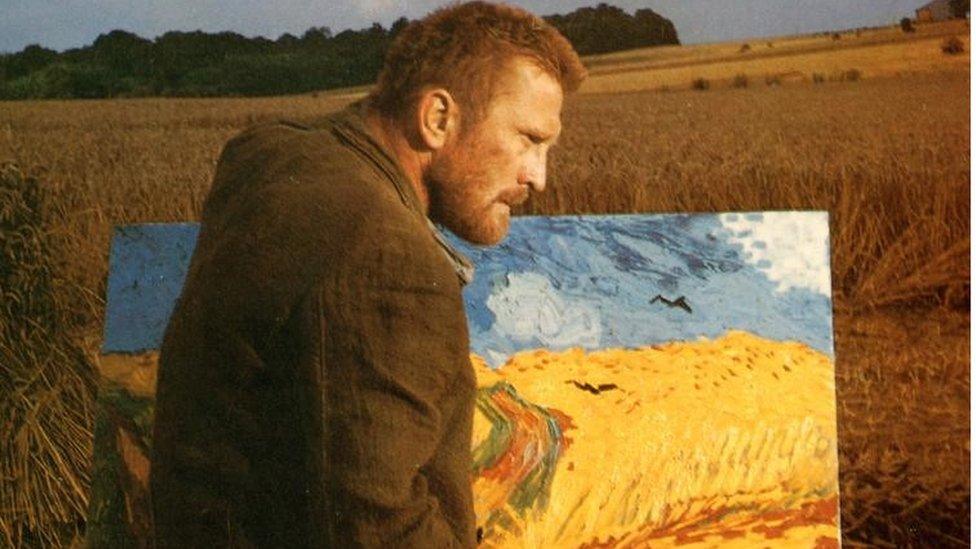
He won much acclaim for his portrayal of Vincent van Gogh
One critic claimed the Kelly role epitomised his persona on and off screen as "a ruthless, selfish, fiercely driven upstart".
His ambition was rooted in his humble Russian origins. He was determined to defy privilege and anti-Semitism.
Several of his most famous roles were as villains, such as the ruthless journalist in Ace In The Hole in 1951, who refuses to let sentiment or morality get in the way of a good story.
He won critical acclaim for his portrayal of Vincent van Gogh in Lust for Life in 1956, but his own lust for power earned him many enemies.
One of his more notable roles of this period was as Colonel Dax, the commander of a French regiment on the Western Front in the Stanley Kubrick film, Paths of Glory
Based on a real-life incident, Douglas is called upon to defend three soldiers charged with mutiny, who are eventually shot. Douglas resisted attempts by Kubrick to change the ending and reprieve the men.
In 1957 Douglas set up his own production company Byrna, named after his mother, in a bid to escape the grip of the big studios, which hired and fired at whim.
He also defied the anti-communist witch-hunts of the McCarthy era by openly hiring a blacklisted writer, Dalton Trumbo, to script Spartacus.
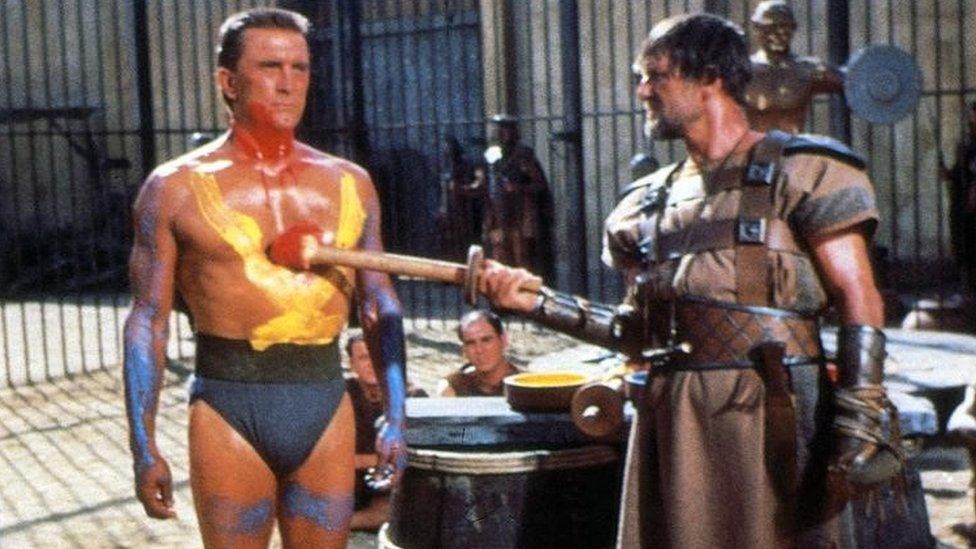
Spartacus represented his own battle against the establishment
The movie, about a slave who rebelled against the Roman Empire, was seen by many as a metaphor for his own defiance of Tinseltown's power brokers.
Despite being riddled with historical inaccuracies, the film went on to win four Oscars.
Douglas faded from the big screen in the 1970s but in his later years made a fairly successful comeback in films such as Tough Guys with Burt Lancaster and Greedy with Michael J Fox.
His energy did not flag as he grew older. He became a director, producer and novelist.
Douglas served four US presidents in the role of special ambassador, and in 1981 received the Presidential Medal of Freedom.
He also created a charitable foundation and donated more than $1m to the Motion Picture and Television Fund.
His autobiography, The Ragman's Son, made the New York Times best-seller list.
Douglas also wrote two novels, Dance with the Devil and The Secret.
As well as Michael and Joel, the children from his first marriage, he had two more sons, who also followed him into the world of movies.
Eric became an actor and Peter became a producer but only his eldest child, Michael, came close to equalling his father's fame.
Eric died in 2004 after an overdose of alcohol and prescription drugs, in what authorities in New York ruled was an accidental death.
Douglas, who was given a lifetime achievement award from the American Film Institute in 1991, suffered a stroke in March 1996 which paralysed one side of his face.
But despite the stroke affecting his ability to speak, he was able to give the acceptance speech at the 1996 Academy Awards when he received a special award for "50 years as a moral and creative force in the motion picture community".
In the same year he played Chester J Lampwick in an episode of the hit animated series The Simpsons.
He continued to work, and appeared in films including Diamonds, in which he appeared with his old friend, Lauren Bacall, and It Runs in the Family in 2003, which co-starred his son Michael, grandson Cameron and ex-wife Diana.
Kirk Douglas was one of the last great Hollywood stars who began their climb to fame at the end of World War Two and certainly one of the most defiant.
"I don't need a critic to tell me I'm an actor," he once said. " I make my own way. Nobody's my boss. Nobody's ever been my boss."
- Published6 February 2020
